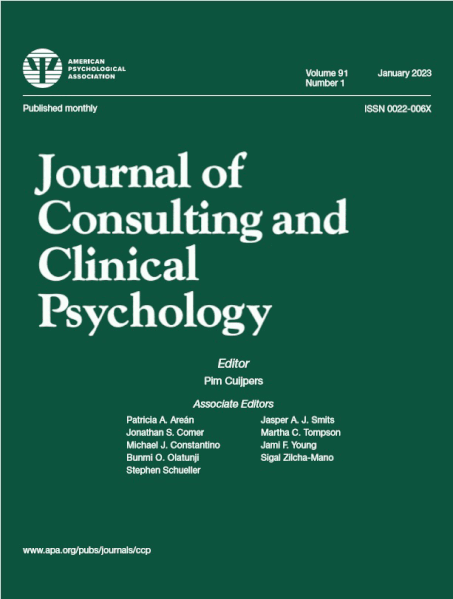一项随机对照试验,比较了针对孤独的简短在线自我指导干预措施。
IF 5
1区 心理学
Q1 PSYCHOLOGY, CLINICAL
引用次数: 0
摘要
目的孤独是一个全球性的健康问题,但目前的孤独干预措施规模不够大,无法惠及许多可能从中受益的人。简短的在线干预可以大大增加获得循证孤独干预的机会。方法我们进行了一项预先登记的三臂试验(N = 908,年龄在 16-78 岁之间),比较了三种自我指导的在线干预:针对孤独的单次干预(SSI)、针对孤独的 3 周 3 次干预以及主动对照支持疗法 SSI(https://ClinicalTrials.结果在所有条件下,孤独感在基线和第 8 周之间都有所下降(b = -5.80; d = -0.55; 95% CI [-0.62, -0.47];p < .01),但在被分配到孤独感 SSI 的患者中,孤独感的下降幅度并不明显(b = -1.27; d = -0.12; 95% CI [-0.30, 0.06]; p = .20)或为期 3 周的干预(b = -0.93; d = -0.09; 95% CI [-0.27, 0.09]; p = .34)与对照 SSI 相比并没有明显下降。参与者认为所有三种干预措施都是可以接受的,但对两种孤独干预措施的评分都高于对照组(p < .01)。完成 10 分钟对照 SSI(86.6%)和 20 分钟孤独感 SSI(69.4%)的参与者远远多于完成 60 分钟 3 周干预的参与者(14.9%)。然而,与我们的假设相反的是,这两种孤独干预措施在减少孤独感方面的效果都不如积极的对照SSI。未来的工作应着眼于设计更有效的孤独感干预措施,并确定孤独感干预措施可能对哪些人群最有帮助。(PsycInfo Database Record (c) 2024 APA, 版权所有)。本文章由计算机程序翻译,如有差异,请以英文原文为准。
A randomized controlled trial comparing brief online self-guided interventions for loneliness.
OBJECTIVE
Loneliness is a global health issue, but current loneliness interventions are not scalable enough to reach many who might benefit from them. Brief online interventions could greatly expand access to evidence-based loneliness interventions.
METHOD
We conducted a preregistered three-armed trial (N = 908, ages 16-78) to compare three self-guided online interventions: a single-session intervention (SSI) for loneliness, a 3-week, three-session intervention for loneliness, and an active control supportive therapy SSI (https://ClinicalTrials.gov, ID: NCT05687162).
RESULTS
Loneliness decreased between baseline and Week 8 across all conditions (b = -5.80; d = -0.55; 95% CI [-0.62, -0.47]; p < .01), but did not decrease significantly more in those assigned to either the loneliness SSI (b = -1.27; d = -0.12; 95% CI [-0.30, 0.06]; p = .20) or the 3-week intervention (b = -0.93; d = -0.09; 95% CI [-0.27, 0.09]; p = .34) than those assigned to the control SSI. Participants found all three interventions acceptable but rated both loneliness interventions as more acceptable than the control (p < .01). Far more participants completed the 10-min control SSI (86.6%) and 20-min loneliness SSI (69.4%) than the 60-min 3-week intervention (14.9%).
CONCLUSIONS
An SSI for loneliness was not significantly less effective than a longer loneliness intervention and had a much higher completion rate. Yet, against our hypotheses, neither loneliness intervention reduced loneliness more than an active control SSI did. Future work should aim to design more effective SSIs for loneliness and identify populations for which SSIs might be most helpful. (PsycInfo Database Record (c) 2024 APA, all rights reserved).
求助全文
通过发布文献求助,成功后即可免费获取论文全文。
去求助
来源期刊

Journal of consulting and clinical psychology
PSYCHOLOGY, CLINICAL-
CiteScore
9.00
自引率
3.40%
发文量
94
期刊介绍:
The Journal of Consulting and Clinical Psychology® (JCCP) publishes original contributions on the following topics: the development, validity, and use of techniques of diagnosis and treatment of disordered behaviorstudies of a variety of populations that have clinical interest, including but not limited to medical patients, ethnic minorities, persons with serious mental illness, and community samplesstudies that have a cross-cultural or demographic focus and are of interest for treating behavior disordersstudies of personality and of its assessment and development where these have a clear bearing on problems of clinical dysfunction and treatmentstudies of gender, ethnicity, or sexual orientation that have a clear bearing on diagnosis, assessment, and treatmentstudies of psychosocial aspects of health behaviors. Studies that focus on populations that fall anywhere within the lifespan are considered. JCCP welcomes submissions on treatment and prevention in all areas of clinical and clinical–health psychology and especially on topics that appeal to a broad clinical–scientist and practitioner audience. JCCP encourages the submission of theory–based interventions, studies that investigate mechanisms of change, and studies of the effectiveness of treatments in real-world settings. JCCP recommends that authors of clinical trials pre-register their studies with an appropriate clinical trial registry (e.g., ClinicalTrials.gov, ClinicalTrialsRegister.eu) though both registered and unregistered trials will continue to be considered at this time.
 求助内容:
求助内容: 应助结果提醒方式:
应助结果提醒方式:


